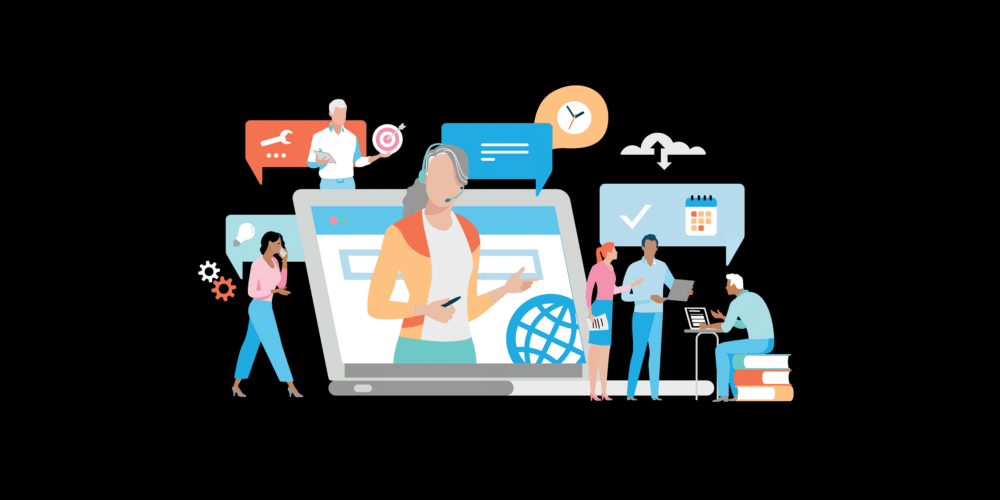In this article on desktop support vs help desk, we explore the key differences between IT support roles, with help desk services focusing on remote troubleshooting and general IT inquiries, while desktop support provides hands-on assistance for hardware and software issues. Understanding these distinctions helps businesses allocate resources effectively for efficient IT operations.
Due the fast-passed technological world we live in, businesses rely heavily on IT support to maintain operational efficiency. Two essential services in this space are help desk support and desktop support. While both play a crucial role in assisting users, their functions differ significantly. Help desk support serves as the first point of contact for troubleshooting and general IT inquiries, while desktop support provides hands-on assistance for hardware and software issues.
Understanding these differences can help organizations allocate the right resources, ensuring seamless IT operations and improved productivity. This guide will break down the key aspects of each service, provide a comparative analysis, and offer insights into selecting the best support strategy for your business.
Help Desk Support
Help desk support is designed to provide immediate assistance for IT-related issues. It is a centralized function that handles general inquiries, troubleshooting, and incident resolution, often remotely.
Common Responsibilities
- Responding to user inquiries via phone, email, or chat
- Troubleshooting software issues and guiding users through solutions
- Resetting passwords and managing access permissions
- Logging and tracking IT issues through a ticketing system
- Escalating complex issues to higher-level technical teams
Benefits
- Quick response times: Ensures that minor IT problems do not disrupt workflow
- Scalability: Can support a large number of users with minimal resources
- Remote assistance: Reduces downtime by offering instant solutions without the need for on-site intervention
Desktop Support
Desktop support focuses on resolving issues related to hardware, operating systems, and software applications that require direct interaction. Unlike help desk services, desktop support technicians often work on-site or via remote desktop tools to diagnose and fix complex technical problems.
Common Responsibilities
- Installing and configuring software and hardware
- Diagnosing and repairing hardware malfunctions
- Performing system updates and security patches
- Setting up workstations and peripherals
- Providing hands-on training and technical support
Benefits
- In-depth problem resolution: Handles more complex issues that cannot be resolved remotely
- Minimized downtime: Ensures that employees have fully functional workstations
- Enhanced security and compliance: Regular maintenance helps prevent vulnerabilities and improves data protection
Comparative Analysis
| Feature | Help Desk Support | Desktop Support |
|---|---|---|
| Primary Function | General troubleshooting and IT inquiries | Direct hardware/software issue resolution |
| Mode of Support | Remote assistance (phone, chat, email) | On-site or remote technical interventions |
| Issue Complexity | Low to moderate | Moderate to high |
| Tools Used | Ticketing systems, knowledge bases, automation tools | Diagnostic software, hardware tools, imaging systems |
| Response Time | Fast initial response | May take longer for in-depth troubleshooting |
Guidance for Businesses
Determining the right support model depends on your organization’s needs, budget, and IT infrastructure.
When to Prioritize Help Desk Support
- If your organization needs quick resolutions for common IT issues
- When cost efficiency is a priority
- If remote support is sufficient for most technical concerns
When to Prioritize Desktop Support
- If employees frequently require hardware-related fixes
- When security and compliance regulations necessitate regular in-person IT support
- If workstations require specialized software installations and configurations
Integrating Both for Maximum Efficiency
For many businesses, a hybrid approach is ideal. A help desk can address general inquiries and minor technical issues, while desktop support can be deployed for hands-on problem-solving and critical IT maintenance.
Is It Desktop Support vs Help Desk or Desktop AND Help Desk?
Both help desk and desktop support services are integral to a well-functioning IT infrastructure. Help desk support provides immediate assistance for software and accessibility issues, while desktop support offers specialized solutions for complex hardware and software concerns.
Understanding the roles of each can help businesses streamline their IT operations, reduce downtime, and enhance user satisfaction. Investing in the right mix of help desk and desktop support services ensures that employees have the technical assistance they need to remain productive and efficient.
